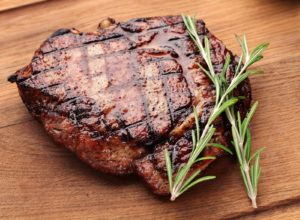 The Paleo diet has been around for years and yet it continues to be controversial. The debate is whether following the Paleo diet long-term has health benefits or not? Supporters of the Paleo (Paleolothic) diet say it promotes gut health and is good for gut microbes, but recent research findings are a strike against this claim. The Paleo diet is based on the hypothesis that humans have not adapted to eating products of agricultural farming such as grains, dairy products, or legumes (beans), as well as all processed foods, so they should be avoided. Instead it stresses eating meat, fish, eggs, nuts, (some) fruits, and vegetables.
The Paleo diet has been around for years and yet it continues to be controversial. The debate is whether following the Paleo diet long-term has health benefits or not? Supporters of the Paleo (Paleolothic) diet say it promotes gut health and is good for gut microbes, but recent research findings are a strike against this claim. The Paleo diet is based on the hypothesis that humans have not adapted to eating products of agricultural farming such as grains, dairy products, or legumes (beans), as well as all processed foods, so they should be avoided. Instead it stresses eating meat, fish, eggs, nuts, (some) fruits, and vegetables.
So what were the new research findings? Australian researchers found that people who had been on a Paleo diet for more than a year ate lower amounts of resistant starch, and so had a different bacteria profile in the gut - with lower levels of some beneficial species. They also had high levels of a biomarker in the blood (trimethylamine-n-oxide or TMAO) that is linked to heart disease.
The problem seems to be the lower intake of resistant starch - which is a carbohydrate that resists digestion in the small intestine and ferments in the large intestine. As the fibers ferment they act as a prebiotic and feed the beneficial bacteria in the gut. More than one type of resistant starch can be present in a single food. And what foods contain resistant starches? Precisely some foods avoided in the Paleo diet: grains, rice, beans, peas, lentils, plantains, and green bananas. A number of studies find health benefits (e.g. gut health) from eating foods with resistant starches.
From Medical Xpress: Heart disease biomarker linked to paleo diet
People who follow the paleo diet have twice the amount of a key blood biomarker linked closely to heart disease, the world's first major study examining the impact of the diet on gut bacteria has found.
Researchers from Edith Cowan University (ECU) compared 44 people on the diet with 47 following a traditional Australian diet. The research, published in the European Journal of Nutrition, measured the amount of trimethylamine-n-oxide (TMAO) in participants' blood. High levels of TMAO, an organic compound produced in the gut, are associated with an increased risk of heart disease, which kills one Australian every 12 minutes.
The controversial Paleo (or 'caveman') diet advocates eating meat, vegetables, nuts and limited fruit, and excludes grains, legumes, dairy, salt, refined sugar and processed oils.
Lead researcher Dr. Angela Genoni said that with the diet's growing popularity, it was important to understand the impact it could have on overall health. "Many Paleo diet proponents claim the diet is beneficial to gut health, but this research suggests that when it comes to the production of TMAO in the gut, the Paleo diet could be having an adverse impact in terms of heart health," she said.
"We also found that populations of beneficial bacterial species were lower in the Paleolithic groups, associated with the reduced carbohydrate intake, which may have consequences for other chronic diseases over the long term."
She said the reason TMAO was so elevated in people on the Paleo diet appeared to be the lack of whole grains in their diet. "We found the lack of whole grains were associated with TMAO levels, which may provide a link between the reduced risks of cardiovascular disease we see in populations with high intakes of whole grains," she said.
The researchers also found higher concentrations of the bacteria that produces TMAO in the Paleo group.
"The Paleo diet excludes all grains and we know that whole grains are a fantastic source of resistant starch and many other fermentable fibres that are vital to the health of your gut microbiome," Dr. Genoni said. "Because TMAO is produced in the gut, a lack of whole grains might change the populations of bacteria enough to enable higher production of this compound.
"Additionally, the Paleo diet includes greater servings per day of red meat, which provides the precursor compounds to produce TMAO, and Paleo followers consumed twice the recommended level of saturated fats, which is cause for concern.
